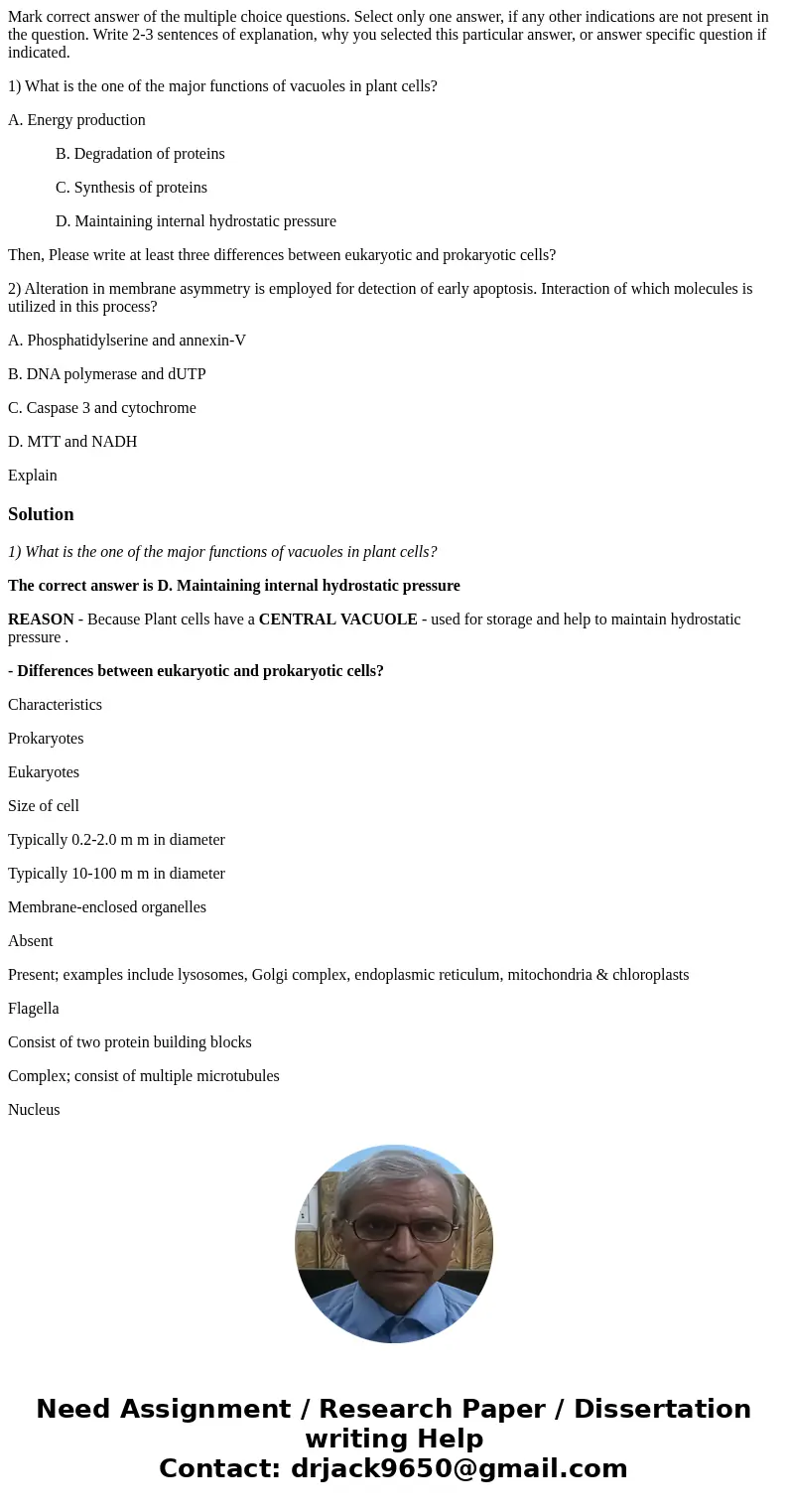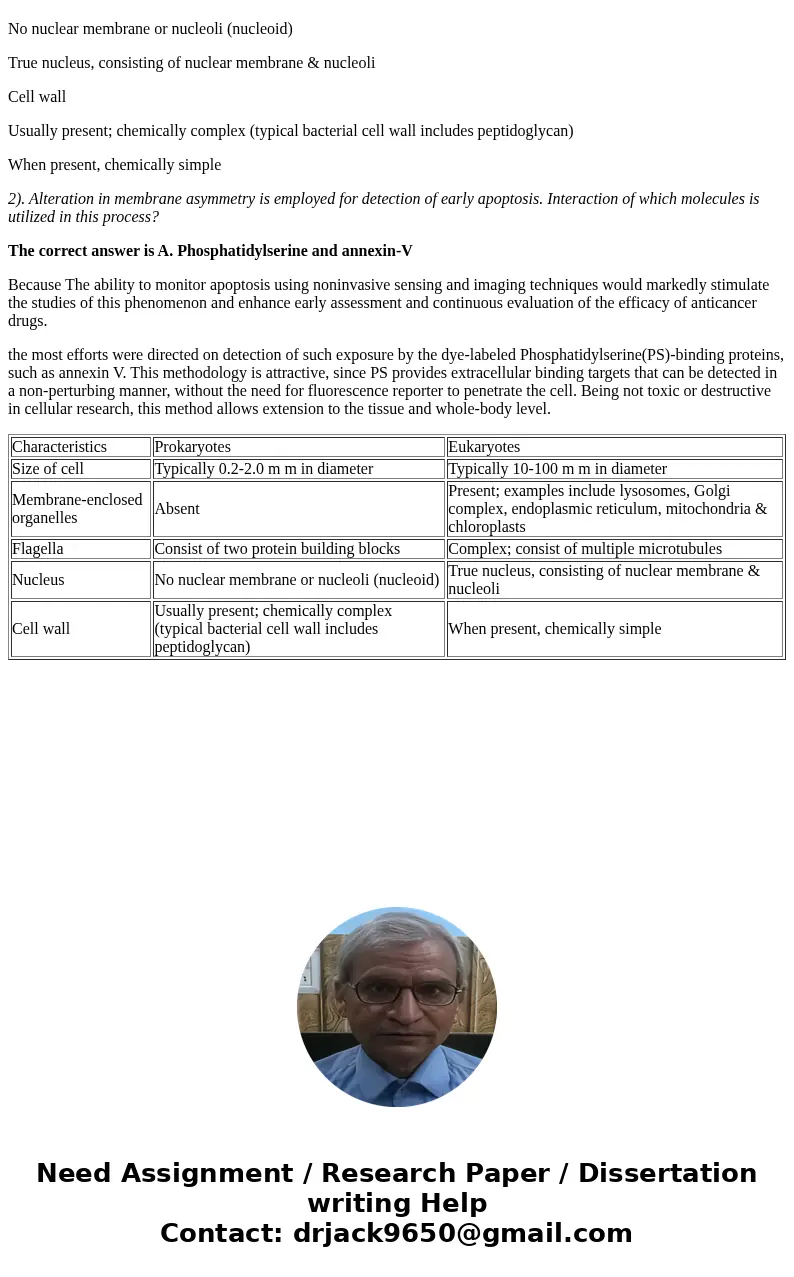Mark correct answer of the multiple choice questions Select
Mark correct answer of the multiple choice questions. Select only one answer, if any other indications are not present in the question. Write 2-3 sentences of explanation, why you selected this particular answer, or answer specific question if indicated.
1) What is the one of the major functions of vacuoles in plant cells?
A. Energy production
B. Degradation of proteins
C. Synthesis of proteins
D. Maintaining internal hydrostatic pressure
Then, Please write at least three differences between eukaryotic and prokaryotic cells?
2) Alteration in membrane asymmetry is employed for detection of early apoptosis. Interaction of which molecules is utilized in this process?
A. Phosphatidylserine and annexin-V
B. DNA polymerase and dUTP
C. Caspase 3 and cytochrome
D. MTT and NADH
Explain
Solution
1) What is the one of the major functions of vacuoles in plant cells?
The correct answer is D. Maintaining internal hydrostatic pressure
REASON - Because Plant cells have a CENTRAL VACUOLE - used for storage and help to maintain hydrostatic pressure .
- Differences between eukaryotic and prokaryotic cells?
Characteristics
Prokaryotes
Eukaryotes
Size of cell
Typically 0.2-2.0 m m in diameter
Typically 10-100 m m in diameter
Membrane-enclosed organelles
Absent
Present; examples include lysosomes, Golgi complex, endoplasmic reticulum, mitochondria & chloroplasts
Flagella
Consist of two protein building blocks
Complex; consist of multiple microtubules
Nucleus
No nuclear membrane or nucleoli (nucleoid)
True nucleus, consisting of nuclear membrane & nucleoli
Cell wall
Usually present; chemically complex (typical bacterial cell wall includes peptidoglycan)
When present, chemically simple
2). Alteration in membrane asymmetry is employed for detection of early apoptosis. Interaction of which molecules is utilized in this process?
The correct answer is A. Phosphatidylserine and annexin-V
Because The ability to monitor apoptosis using noninvasive sensing and imaging techniques would markedly stimulate the studies of this phenomenon and enhance early assessment and continuous evaluation of the efficacy of anticancer drugs.
the most efforts were directed on detection of such exposure by the dye-labeled Phosphatidylserine(PS)-binding proteins, such as annexin V. This methodology is attractive, since PS provides extracellular binding targets that can be detected in a non-perturbing manner, without the need for fluorescence reporter to penetrate the cell. Being not toxic or destructive in cellular research, this method allows extension to the tissue and whole-body level.
| Characteristics | Prokaryotes | Eukaryotes |
| Size of cell | Typically 0.2-2.0 m m in diameter | Typically 10-100 m m in diameter |
| Membrane-enclosed organelles | Absent | Present; examples include lysosomes, Golgi complex, endoplasmic reticulum, mitochondria & chloroplasts |
| Flagella | Consist of two protein building blocks | Complex; consist of multiple microtubules |
| Nucleus | No nuclear membrane or nucleoli (nucleoid) | True nucleus, consisting of nuclear membrane & nucleoli |
| Cell wall | Usually present; chemically complex (typical bacterial cell wall includes peptidoglycan) | When present, chemically simple |


 Homework Sourse
Homework Sourse